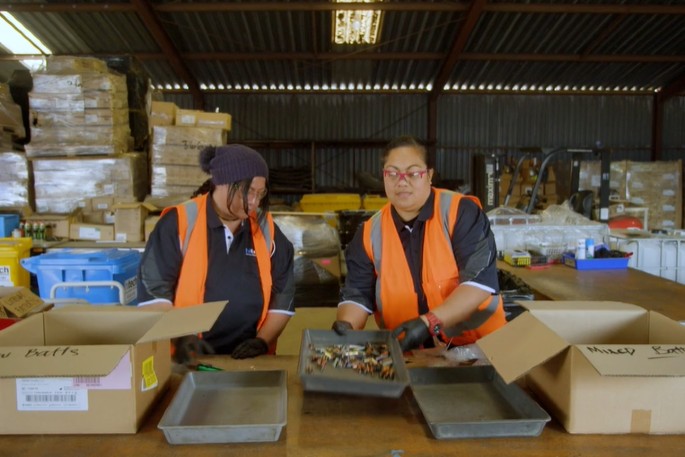This Content Is Only For Subscribers
They were once destined for landfill. Now they’re powering toys, torches and community projects across South Auckland.
With the upsurge in technology use, people are flying with more gadgets and chargers than ever before. Around 470 batteries on average are removed from checked luggage each day, according to the Civil Aviation Authority (July 2024 to June 2025).
Auckland Airport is now working in partnership with Aviation Security to donate any unopened packets of batteries so they can be diverted from landfill and reused in the community. Since August 2024, around 145kg of batteries are being donated every month, mostly AA and AAA batteries.
Auckland Airport chief strategic planning officer Mary-Liz Tuck says everyday travellers unwittingly pack batteries in their checked bags, who may be unaware of flight regulations.
All bags are security scanned by Aviation Security before going into the belly hold of planes for safety reasons, and batteries must be removed by Aviation Security due to the significant fire risk in the aircraft’s baggage hold.
“Since the programme began, together we’ve donated about 95,000 batteries to the South Auckland community in less than a year – that’s equivalent to more than three large supermarket trolleys,” she says.
“My top tip for travelling: pack batteries, power banks and ear buds in your carry on bags to avoid them being removed from your checked luggage.”
Batteries account for 70 per cent of all items confiscated by Aviation Security making them the number one item taken out of bags during screening.
“We don’t want to be taking people’s batteries from their checked-in bags but batteries can be dangerous because they can overheat and catch fire,” says CAA deputy chief executive aviation security Fred Stein.
“And our priority is and always will be to keep people safe and secure when they fly. So that’s why batteries, as well as power banks, earbuds, cigarette vapes must go in your carry on. If you’re not sure about the rules and restrictions, check the passenger information section on our website.
“We’re thrilled to be partnering with Auckland Airport so that the batteries we do remove from checked-in bags are going to schools and charities and being recycled and not going to landfill. We are 100% behind this kind of sustainability!”
Auckland Airport’s waste disposal supplier, HiTech Services, sorts the batteries and separates out full packs of batteries for donation.
The batteries are then sent to KiwiHarvest, an organisation that rescues items and surplus food from supermarkets and wholesalers, distributing them to more than 200 charities across New Zealand.
The batteries are primarily used by families with donated toys and by schools for education purposes.
“While our core mahi is rescuing food, providing items like batteries, which can ease pressure on tight household budgets, is a win,” says KiwiHarvest CEO Angela Calver.
“These batteries have been warmly welcomed, going to communities who put them to good use. It’s a simple but powerful example of how collaboration can reduce waste and support those doing good in our communities.”
Social housing charity Maranga Fanau founding director Phyllis Latu has received around 10,000 batteries through the programme to aid families.
“If our whanau have to decide between batteries or food at the supermarket, batteries are often skipped. It might be a small object but it can make a difference for families, keeping smoke alarms running and TV remotes operating,” Phyllis says.
Reducing waste to landfill
Mary-Liz says Auckland Airport is on track to cut waste to landfill by 20 per cent by 2030, compared to 2019 levels.
“We’re always looking for more opportunities to reduce waste. For example, we have a composting programme which has been growing over the last two years, we’ve replaced paper towels with jet air hand dryers in both terminals and we’re exploring further initiatives. Although we’re meeting our targets, as traveller numbers grow we need to ensure our waste reduction keeps pace.”
Top tips to reduce waste while travelling through AKL
- Pack batteries, power banks and ear buds safely in your carry on luggage to avoid them having to be confiscated from checked-in bags.
- Loose batteries need to have the terminals (or ends) covered, such as with tape, so they are safe, before they go in your carry on bags. You can take up to 20 spare batteries on your trip. These limits are often updated so check the latest rules on the Aviation Security website.
- If you’re wanting to take your hair straighteners on your trip, please check the restrictions on the aviation.govt.nz website, as there are very specific rules around these devices.
- Bring your empty drink bottle and make use of the refillable water stations after security at both the domestic and international terminals. Sealed liquids – not take-out coffee though – can be taken through the domestic terminal.
- Please put your rubbish in the correctly marked bin. If in doubt, place it in the general waste bin to reduce the risk of contamination of recyclable materials.
- Remember to use the online New Zealand Traveller Declaration when arriving at AKL, to save on paper forms. You can do this online or downloading the app from the app store.
- When travelling internationally remember all liquids, aerosols and gels should be in containers of 100ml or less with a total volume of one litre or less. Foods such as honey and marmite are also included in this rule.



